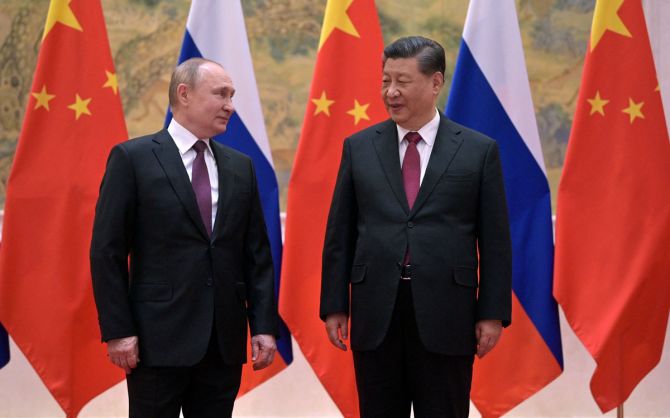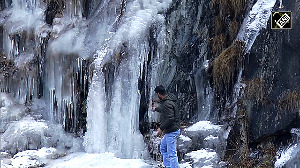Beijing will be intently watching Washington's response for any hint of weakness.
Xi Jinping, who feels China has a limited window of strategic opportunity, will be emboldened to take additional initiatives in the Indo-Pacific and specifically against India and Taiwan, warns Jayadeva Ranade, the former senior RA&W officer and China expert.

After having threatened, watched and warned the West for nearly a month, Russian President Vladimir Putin ultimately launched a full-scale land and air invasion of Ukraine on the night of February 23.
This challenges the US and West and has the potential to upturn the international world order existing since the end of the Cold War.
It will undoubtedly have worldwide repercussions.
Before his decisive action, however, Putin had a crucial meeting with Chinese President Xi Jinping in Beijing on February 4.
This was one of the very few times since the Covid pandemic that Putin travelled outside Moscow
As apparatchiks nurtured in their respective Communist parties both, Xi Jinping and Putin, share similar ideologies and this was reflected in the reports on the summit.
Commenting on the joint statement issued after the summit, the Chinese Communist party's official newspaper People's Daily (February 4) noted two points which said they 'firmly support each other's core interests and oppose external forces interfering in the internal affairs of the two countries and undermining the security and stability of the common surrounding areas of the two countries' and 'the two sides will uphold responsibility and morality, promote world multi-polarization and democratization of international relations, and work together to build a new type of international relations'.
An interesting article posted (February 6) on the popular Chinese portal Weixin amplified these aspects and portrayed the summit as an 'anti-hegemonic struggle'.
It asserted that the document 'comprehensively criticizes and denies the dominance of hegemony' and can, therefore, 'be called a joint declaration against hegemony'.
In all probability Putin gave Xi Jinping a fair insight into his plans and obtained certain assurances.
This does not appear to have percolated through the Chinese system including China's ministry of foreign affairs.
The withdrawal of Russian military units from the borders with China as mentioned by the Wall Street Journal on February 23, and meeting of the politburo convened immediately after Putin's departure point to this.
Further, Putin launched his invasion days after the Beijing Winter Olympics ended so as not to deny Xi Jinping the afterglow of their success.
The close Sino-Russian ties will prompt China to support Russia, but while trying to avoid retaliation from the US and West.
Chinese Foreign Minister Wang Yi's statement that 'the result in Ukraine today is the consequence of the failure to implement the Minsk II Agreement' and that China views both parties as responsible for the failure indicates Chinese support.
Hongkong's South China Morning Post on February 16 quoted two Chinese researchers. Zhang Tuosheng, a researcher with the Beijing-based Grandview Institution and former strategic issues researcher with the PLA National Defence University, said: 'Of course we don't want [an invasion]. We have a close relationship with Russia and maintain a good one with Ukraine.'
Zhand added that an invasion, while unlikely, would do Beijing no good in terms of the economic and diplomatic pressure it would face from the US and Europe, and that China wanted to see agreement reached through negotiation.
Separately, Shi Yinhong, a professor of international affairs at Beijing's Renmin University, said, 'If a war breaks out in Ukraine, the United States will realistically have to reduce its attention and resources to China in the Indo-Pacific.'
'But on the other hand,', Shi added, 'the war [would be] a huge step down the path of radicalisation in world politics, and doomed to inflict great pressure on China for an arms race, as well as Taiwan and the South China Sea.'
An interesting sidelight to the developments and one which Beijing has kept quiet about is its security agreement with Ukraine.
Signed between China and Ukraine on December 4, 2013, this was the very first security agreement that China concluded with any country.
It states that 'China promises ... to provide security guarantees to Ukraine if Ukraine is attacked by nuclear weapons or threatened by such aggression.'
The war is not over and this agreement could yet be invoked, but Beijing has chosen to ignore the agreement.
Putin has nevertheless raised the stakes immensely with his threat of 'consequences you have never faced in your history' for 'anyone who tries to interfere with us'.
With the capture, or takeover, of Ukraine, Putin is also incidentally reducing the asymmetry between Russia and China.
Ukraine is a crucial supplier of agricultural and military products to China.
After the invasion, Putin will have control on Ukraine's exports.

Ties between China and Ukraine have grown appreciably in recent years.
China is a key trade partner for Ukraine, providing 14.4% of its imports and a destination for 15.3% of its exports.
Agricultural trade between China and Ukraine increased by 33% in the first half of 2021, over the same period in 2020.
Ukraine began selling corn to China and by 2019 had become its largest supplier, accounting for more than 80% of Chinese corn imports.
Ukraine is also a large supplier of soybean to China.
In 2013, China's Xinjiang Production and Construction Corps signed an agreement with Ukraine's KSG Agro to lease 247,105 acres of agricultural land for cultivation and pig farming over a 50-year period.
China's defence industry remains dependent on Russia, Ukraine, and France for aircraft and naval engines, despite long-drawn efforts to develop domestic capability.
Ukraine alone supplies a variety of important military equipment to China, including turbofan engines for aircraft, diesel engines for tanks, and gas turbines for air-to-air missiles.
Ukraine also has very large iron ore deposits.
How the US and West react and particularly the scope and bite of the sanctions they impose, will determine the future course of events.
China will be hit hard in case the sanctions automatically get applied -- as US law provides -- to entities dealing with the country under sanctions.
Beijing will be intently watching Washington's response for any hint of weakness.
Xi Jinping, who feels China has a limited window of strategic opportunity, will be emboldened to take additional initiatives in the Indo-Pacific and specifically against India and Taiwan.
Analysts should realise that the Chinese military scrutinises US and Russian military tactics and strategy -- Sun Tzu is mentioned only when they refer to history!
Jayadeva Ranade, former additional secretary, Cabinet Secretariat, Government of India, is the President, Centre for China Analysis and Strategy.
You can read Mr Ranade's earlier columns here.
Feature Presentation: Aslam Hunani/Rediff.com











 © 2025 Rediff.com -
© 2025 Rediff.com -